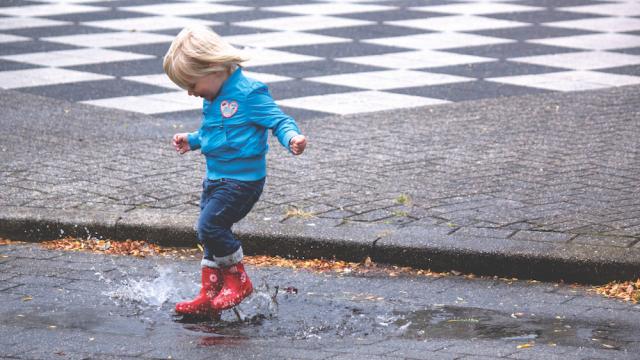As cliché as it is, kids really are like tiny sponges, which for parents, is the coolest and most terrifying thing. The way you respond to situations, including the words that you choose, can help shape their worldview for life. No pressure!
Photo: Pexels
Even interactions that seem small can be quite meaningful. Take conversations about the weather, for instance. In Tools of Titans: The Tactics, Routines and Habits of Billionaires, Icons and World-Class Performers, a book of interviews by Tim Ferriss, author and former child chess prodigy Josh Waitzkin offered parents this advice: Change your language around rainy days.
He explains:
One of the biggest mistakes that I observed in the first year of [my son] Jack’s life was parents who have unproductive language around weather being good or bad. Whenever it was raining, you’d hear moms, babysitters, dads say, “It’s bad weather. We can’t go out,” or if it wasn’t, “It’s good weather. We can go out.” That means that somehow, we’re externally reliant on conditions being perfect in order to be able to go out and have a good time. So, Jack and I never missed a single storm, rain or snow, to go out and romp in it. Maybe we missed one when he was sick. We’ve developed this language around how beautiful it is. Now, whenever it’s a rainy day, Jack says, “Look, Dada, it’s such a beautiful rainy day,” and we go out and we play in it. I wanted him to have this internal locus of control – to not be reliant on external conditions being just so.”
As someone who regularly declares that it’s “too cold” for the park any time the temperature dips below 22C, this hits me. As the Norwegians say, “Det finnes ikke dårlig vær, bare dårlig klær,” or “There is no bad weather, only bad clothes.” OK, fine. But the advice also applies to situations beyond the day’s forecast. It’s easy to draw conclusions based on the conditions we see, and stop there. “I got a bad mark on the test because the teacher explained the material poorly.” “I’m not successful because my industry is too competitive.” “I am unhappy because I had bad parents.” What if we shifted our focus to the things we can control and helped our kids do so, too?
You might try giving your kids more choices, letting them see the consequences of their choices, helping them find the things that are in their power to change, and supporting a growth mindset. And when it rains, grab your raincoat and boots and go. Remember, kids, there’s no bad weather – only mums like me who kind of hate the cold.

Comments